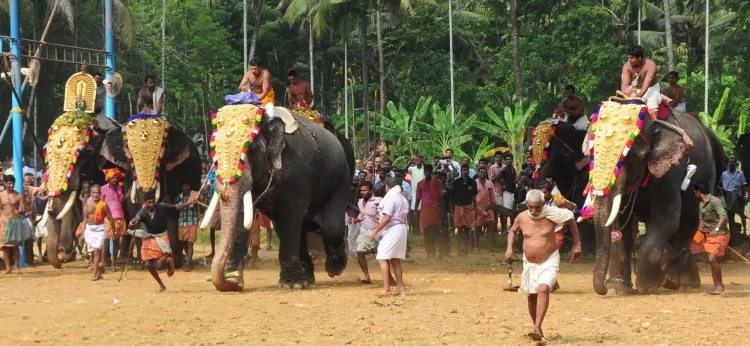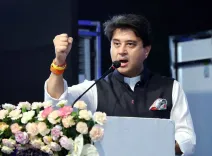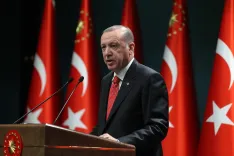Temple Trusts in Kerala Approach Supreme Court Against Elephant Management Restrictions for Thrissur Pooram

New Delhi, Dec 17 (NationPress) The temple trusts of Thiruvambady and Paramekkavu Devaswoms have filed a petition with the Supreme Court contesting the limitations enforced by the Kerala High Court regarding elephant management during the Thrissur Pooram.
Regarded as the "mother of all festivals" in Kerala, the Thrissur Pooram was initiated by Sakthan Thampuran, the Maharaja of the former Kochi state, in the late 18th century.
The most anticipated feature of the Pooram festivities is the elephant parade — showcasing over 50 majestic elephants, alongside spectacular firecracker displays, commencing in the afternoon and extending into the early hours of the following day.
The special leave petition presented to the apex court claims that the Kerala HC made an error in issuing directives related to festival-specific matters without any breach of the Central statute like the Prevention of Cruelty to Animals Act, 1960 or the 2012 Rules.
It further stated that judicial interference is justified only in the absence of a statutory framework and that by overlooking the comprehensive statutory scheme set out by the 2012 Rules, the Kerala High Court has unjustly overstepped the role of the legislature and executive in managing such festivals.
The appeal, submitted via advocate Abhilash M.R., noted that the spatial restriction requiring a minimum distance of 3 meters between elephants significantly hampers the historic festival, as the millennium-old venue, the Vadakkumnathan Temple, crucial to Thrissur Pooram, cannot accommodate such limitations.
"This venue, with its traditional layout, has been the heart of the Pooram for centuries, and the directive from the Kerala High Court overlooks the importance of this historic and UNESCO-recognised tradition," it asserted.
The Kerala High Court had previously prohibited the use of elephants in the state’s temples under the guise of tradition while deliberating on a series of writ petitions aimed at preventing cruelty against captive elephants in Kerala due to their exhibition in temples and festivals.
In its controversial ruling, the Kerala HC remarked: "We do not believe that there is any essential religious practice of any faith that necessitates the use of elephants in festivals. Essentially, these animals are treated as tradable assets, with their owners or custodians primarily focused on financial gain. Allegedly, the festivals in Kerala have become so commercialized that even before a festival commences, there is competition among temple committees regarding the number of elephants to be paraded and the fame of specific elephants being showcased."
The court acknowledged that from 2018 to 2024, 160 captive elephants have perished, indicating that nearly 33 percent of the total recorded captive elephants (509 in 2018) have died in this short span of seven years.
Considering all factors, the Kerala High Court mandated that from now on, festival organizers must provide applications with all necessary details to the relevant authorities at least one month in advance of the festival.
Additionally, it instructed the concerned authorities to ensure that elephants receive a rest period of no less than three days between exhibitions; moreover, exhibitors must guarantee that elephants are provided ample food, a constant supply of clean drinking water, and a temporary tethering area that is spacious and hygienic.
Moreover, it ordered that elephants should not be paraded on public roads between 9 a.m. and 5 p.m., and they must not be transported between 10 p.m. and 4 a.m. Additionally, elephants must have at least eight hours of rest within any continuous 24-hour period.





